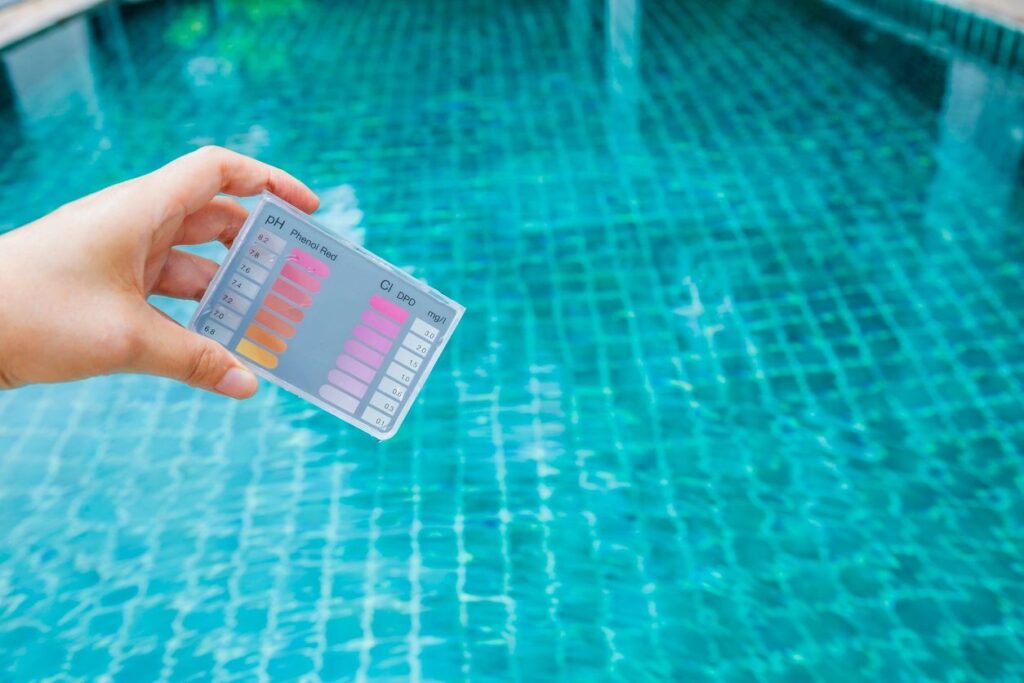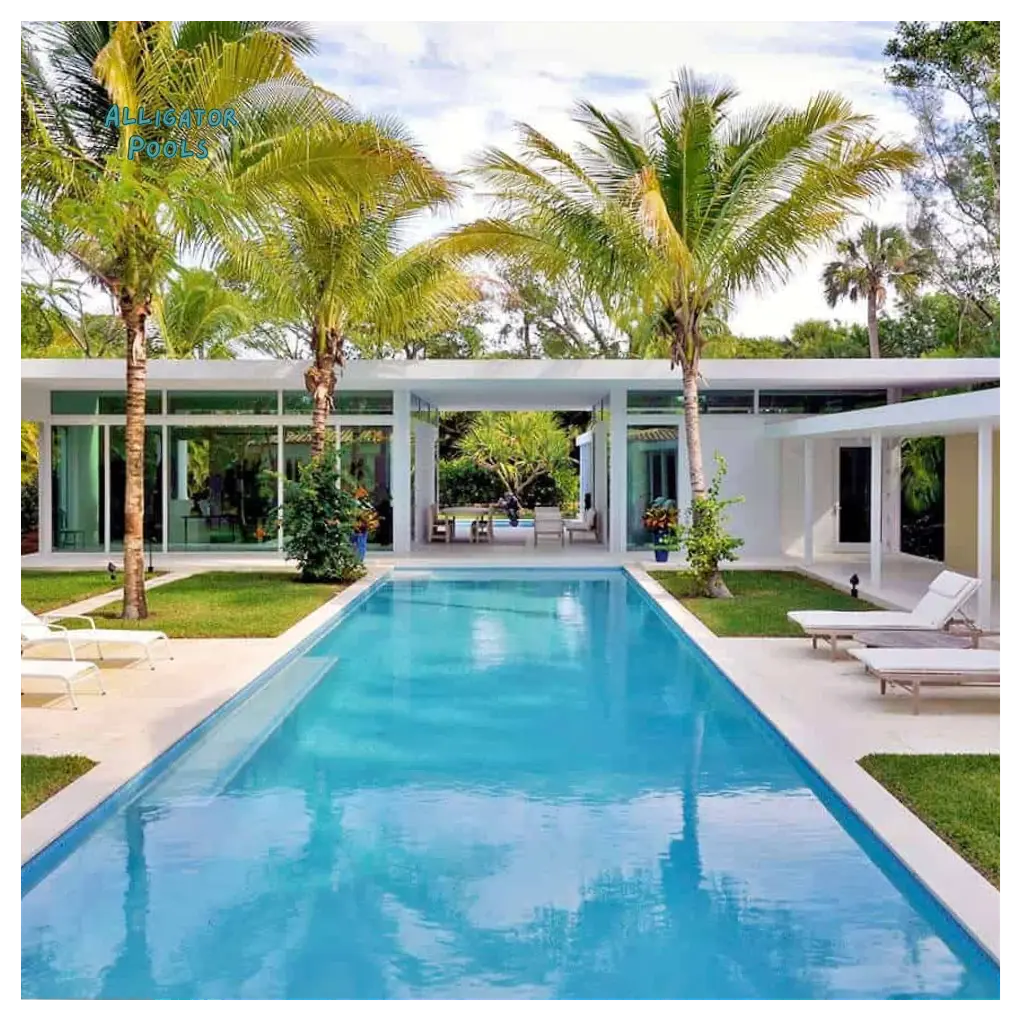Home » Pool Cleaning Florida » BLOG-Pool Chemicals Guide
Maintaining a swimming pool in Florida involves not just keeping it clean and inviting, but understanding and managing the delicate balance of pool chemistry. This guide is crafted to demystify the complex world of pool chemicals for Florida pool owners, providing the knowledge needed to ensure your pool remains a safe, clean, and enjoyable place. Whether you’re new to pool ownership in Florida or have years of experience in the area, mastering the fundamentals of pool chemistry is crucial for the health of your pool and its swimmers.
Balanced water is the cornerstone of pool chemistry, especially where the climate can affect pool water more significantly. Achieving this balance is critical for protecting pool equipment, ensuring swimmer comfort, and maximizing the effectiveness of pool chemicals.
The ideal pH range for a Florida pool, which ensures optimal chlorine effectiveness and swimmer comfort, is between 7.2 and 7.8. This range is particularly important given Florida’s climate, where factors like rainfall can alter pH levels more frequently.
Alkalinity acts as a pH buffer, helping to stabilize the pH levels in your Florida pool. Maintaining the correct alkalinity range, typically between 80 and 120 ppm (parts per million), is essential for preventing sudden pH fluctuations that can harm pool surfaces and affect swimmer comfort. These fluctuations are more common during Florida’s rainy season.
Calcium hardness refers to the amount of dissolved calcium in the pool water. Ideal levels (between 200 and 400 ppm) prevent plaster degradation and scaling. Too much calcium can lead to cloudy water and scale formation, while too little can cause plaster surfaces to erode in the Florida climate.

Chlorine is the most used chemical for sanitizing pool water in Florida. It kills bacteria, algae, and other pathogens, ensuring the pool water is safe for swimming. Regular monitoring and adjustment of chlorine levels are necessary to maintain proper sanitation.
Bromine is an effective alternative for those sensitive to chlorine in pools. It works well in hot water environments, making it a popular choice for Florida spas and hot tubs. However, it’s typically more expensive than chlorine and requires different testing parameters.
Cyanuric acid protects chlorine from being quickly degraded by sunlight, extending its effectiveness. Ideal levels for cyanuric acid are between 30 and 50 ppm. It’s especially important for outdoor Florida pools that are exposed to direct sunlight.
Algaecides are chemicals used to prevent algae growth, a common issue in Florida pools due to the state’s warm weather. Regular use of algaecides, in conjunction with proper sanitation practices, can keep your pool algae-free, all year round!
Regular testing of your pool water is crucial for maintaining chemical balance, especially in Florida. Test kits or digital testers can be used to measure pH, chlorine levels, alkalinity, and calcium hardness, guiding necessary adjustments.

Adjusting chemical levels involves adding chemicals to increase or decrease pH, alkalinity, calcium hardness, and sanitizer levels based on the unique needs of Florida pools. Understanding how these chemicals interact is essential for effective pool management.
Shocking involves adding a high dose of chlorine or a non-chlorine shock to your pool to break down organic contaminants and restore chlorine’s effectiveness. It’s recommended to shock your pool after heavy usage or extremely wet weather in Florida.
The summer months are synonymous with the hot, rainy weather, bringing about specific challenges for pool maintenance in Florida. Increased rainfall can significantly dilute pool chemicals, such as chlorine, and disrupt the pH balance. To combat these issues, it’s essential for Florida pool owners to:
Increase Testing Frequency: Test your Florida pool water more frequently to closely monitor and adjust chemical levels as needed. Rainwater can introduce contaminants and lower chlorine levels, necessitating more frequent chemical adjustments.
Maintain Proper Drainage: Ensure your pool’s drainage system is functioning correctly to prevent overflow and maintain proper water levels.
Adjust Chlorine Levels: You may need to increase chlorine or sanitizer levels to counteract the dilution caused by Florida’s heavy rainfalls.
Hurricanes are a way of life in Florida and hurricane season poses a unique set of challenges for pool owners. High winds and heavy rain can introduce a large amount of debris and contaminants into your pool. Preparing your pool for a hurricane in Florida involves several important steps:
Removing Loose Items: Secure or remove all loose items around your pool area, such as patio furniture and pool toys, to prevent them from becoming airborne.
Shocking Your Pool: Consider adding an extra shock treatment to your pool before a storm hits. This will help manage the increased load of contaminants. That said, make sure that you will indeed be hit by the hurricane. Shocking your pool when it’s not needed adds additional wear and tear on your pool’s surface.
Do Not Empty Your Pool: Keeping water in your pool provides weight to hold the pool in place, especially during heavy rains that could otherwise lift a pool due to hydrostatic pressure. Our high water-table in Florida is unique and we hear of stories after every storm of someone’s pool ‘popping’ out of the ground!
Unlike colder climates where pools are winterized and closed, in most of Florida, pool season extends year-round thanks to the milder winter temperatures. However, pool care during winter in Florida does change:
Reduced Chemical Usage: Cooler temperatures in Florida and less frequent use mean that pools require fewer chemicals to maintain balance. Monitor your pool’s chemical needs closely and adjust as necessary.
Monitor Water Levels with Heat Pumps: If you use a heat pump to keep your pool warm during cooler days, be mindful of evaporation rates. Heated pools will lose more water to evaporation in Florida, which can concentrate chemicals if not properly monitored and adjusted.
Regular Maintenance is Still Required: Although your pool might be used less, regular cleaning and maintenance are still necessary to prevent algae growth and maintain water clarity.
In conclusion, by regularly adjusting your pool’s maintenance routine to account for the unique weather conditions, you can ensure that your pool remains a clean, safe, and inviting oasis all year round.
Handling pool chemicals safely is paramount to prevent accidents. Always follow the manufacturer’s instructions, store chemicals in a cool, dry place, and never mix different chemicals together when maintaining your Florida pool.
We all know that the joy of pool ownership comes with the responsibility of maintaining a clean and healthy swimming environment. Pool maintenance in Florida can be particularly challenging due to its unique climate and environmental factors. Alligator Pools is committed to helping you navigate these challenges, ensuring your pool remains a source of joy and not a cause for concern.
Cloudy pool water is a common issue that can result from several factors, including improper chemical balance, inadequate filtration, and environmental contaminants. To address cloudy water, first, ensure your pool’s filtration system is operating correctly and efficiently. Regularly check and clean the filter to prevent clogs and ensure optimal performance. Next, test your pool’s chemical levels to ensure they are within the recommended ranges. Imbalances in pH, chlorine, or alkalinity can quickly lead to cloudy water. Adjusting these levels accordingly can often clear up the water within a few days. Additionally, consider using a pool clarifier to coagulate particles, making them easier for the filter to catch.
Stains on your pool’s surfaces can be caused by metals in the water, such as iron, copper, and manganese, or by organic material like leaves, dirt, and algae. Identifying the source of the stain is key to determining the appropriate treatment. For metal stains, a sequestering agent can help lift and remove discoloration. For organic stains, shock treatment followed by brushing and vacuuming can usually restore your pool’s surfaces to their original condition. Regular pool maintenance and using a pool cover can help prevent stains from forming.
Scaling refers to the buildup of minerals on your pool’s surfaces and equipment, primarily caused by high calcium hardness levels. Scaling can make your pool look unsightly and can also damage your pool’s filtration system. To combat scaling, test and adjust the calcium hardness levels in your pool. If scaling has already occurred, a descaling agent can be used to dissolve the buildup. Prevent future scaling by keeping the pool’s chemistry balanced, particularly by managing the pH and alkalinity levels.
Maintaining a pool in Florida’s unique climate presents a variety of challenges, but understanding the intricacies of pool maintenance and responding with the right care strategies can make all the difference. Addressing common issues like cloudy water, green algae, surface stains, and scaling requires a proactive approach to pool chemistry and regular physical maintenance. Ensuring your pool’s chemical balance is not just about keeping the water clear; it’s crucial for the health and longevity of your swimming environment.
Finally, by understanding the roles of different pool chemicals and committing to a routine of regular upkeep, you can provide a safe, clean, and inviting pool for everyone to enjoy under the Florida sun. With the right knowledge and a little diligence, your pool can remain a source of leisure and relaxation year-round. Alligator Pools is dedicated to helping you achieve and maintain this balance, ensuring that your pool stays in top condition for years to come.
In Florida, it’s recommended to test your pool’s water 2-3 times per week in the summer and at least weekly in the winter. More frequent testing may be needed after heavy rain or bather loads to ensure proper chemical balance. If you engage a professional pool cleaner such as Alligator Pools, we’ll handle that for you!
It depends on the chemicals being added to your Florida pool but assuming it’s one of your standard pool maintenance chemicals, it’s best to wait at least 30 minutes after adding before swimming in your pool to allow for proper dispersion and avoid skin irritation. If you’re adding yourself, always follow label directions regarding re-entry times.
Chlorine is more commonly used as a pool sanitizer in Florida for its affordability and effectiveness. Bromine lasts longer but is more expensive. Those with sensitivities may tolerate bromine better. Both kill bacteria and algae.
To lower pH in a swimming pool, muriatic acid or dry acid can be carefully added in small increments. Always retest after adding. pH ‘decreasers’ are also available. Avoid ‘pH bouncing’ by adjust your level gradually.
Cloudy pool water in Florida is typically caused by inadequate filtration, poor chemical balance, algae growth, debris accumulation, or overuse from swimmers. Ensure proper filtration, circulation, and chemical adjustments.
Prevent algae in Florida pools by maintaining proper sanitizer levels (1-3 ppm chlorine or 2-4 ppm bromine), shocking regularly, keeping pH in balance, running filters adequately, using algaecides if needed, and brushing surfaces weekly.